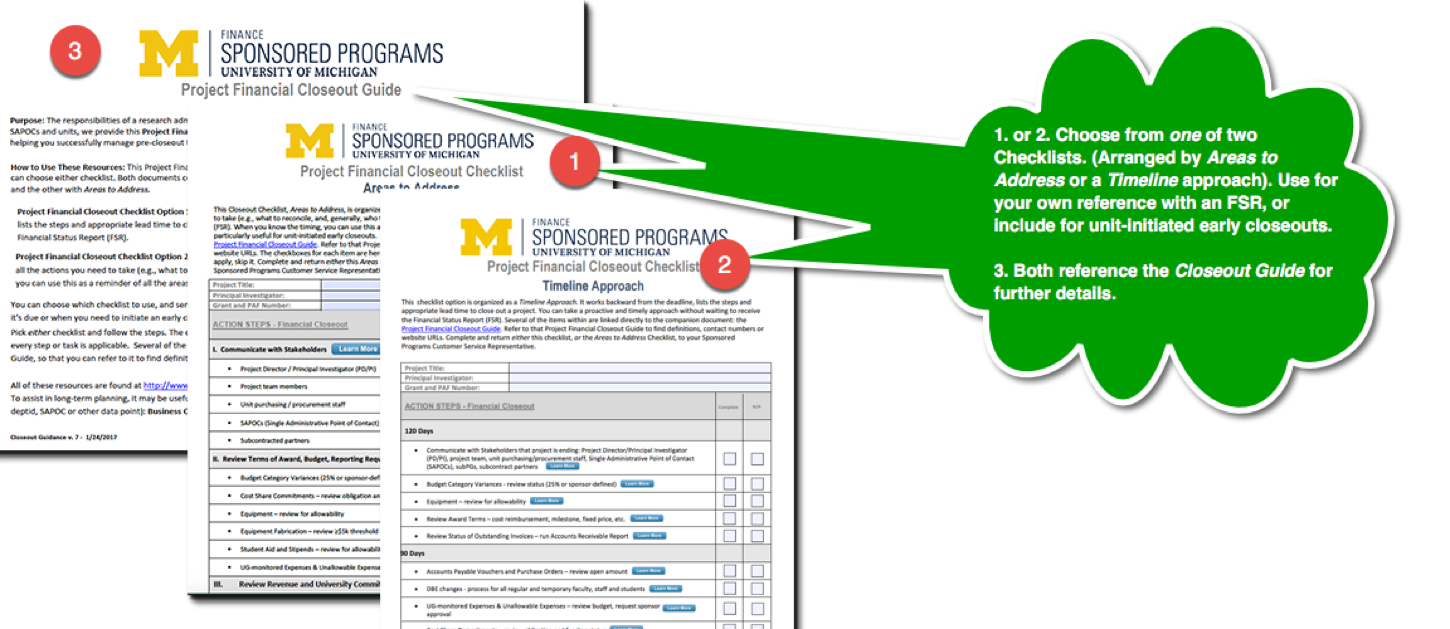You are here
Close Out Project
Tips for a Successful Closeout/Inactivation
- End all employee’s effort as of the last day of the project period
- End all recurring expenses as of the last day of the project period
- Refer to Sponsored Programs Closeout Checklist & Guide
- If you want to close out a project early, send your request and attached a completed closeout checklist, to earlycloseout@umich.edu.
At the end of a project there are important considerations to make sure the project comes to an orderly close. The University has an obligation to sponsors to submit a final technical and financial report. Perhaps inventions or patents are necessary. The necessary closing procedures may vary, depending on the policies of the sponsoring agency and whether the support was in the form of a grant or contract.
For financial closeouts, be sure to refer to the Sponsored Programs Closeout Checklist.
Overview
Project Closeout
The University has an obligation to close out the project and submit final reports to the sponsor. Closing procedures may vary depending on the policies of the sponsor and whether the support was in the form of a grant or contract. Failure to adhere to these reporting requirements in connection with a grant or contract may result in the sponsor withholding new awards or suspending payments for costs on the completed project or other University projects funded by the sponsor.
- Final Technical Report - The PI has the responsibility to prepare the final technical report. The report may be submitted by the PI or ORSP depending on the sponsor's requirements.
- Final Financial Report -Sponsored Programs prepares a final financial report, which is sent to the PI for review and signature approval. In most cases, Sponsored Programs will submit the final, approved report to the sponsor.
- Invention & Property Reports - Most sponsors require the University to report any inventions, discoveries, or other novel commercial developments that were a result of the funded project. Many federal agencies also require a report on property disposition. To ensure proper submission of these reports, the PI should work with ORSP and:
For complete details, scroll down and download the Project Closeout Guide. Other common considerations when a project is winding down:
A No-Cost Extension (NCEs) provides additional time beyond the award's closure date are handled through the Award Change Request (ACR) process. Sometimes, an NCE is needed to allow the principal investigator (PI) to request that the sponsor grant additional time (but not funding to meet the project milestones.
Purchases require 90-day advance approval. Please see the ACR process.
Financial Status Reports and Project Closeout Responsibilities
The Finance-Sponsored Programs Reporting area is responsible for the financial reporting portion of project close-out. They prepare the Uniform Guidance monitored costs expenditure review and any financial reports required by the sponsor, including the project closeout reports. They process the financial status report (FSR) in accordance with the Uniform Guidance (2 CFR 200) (particularly Section 200.327). These guidelines set forth detailed requirements with respect to the complete and timely submission of financial reports and other such closeout procedures for federal grants and contracts.
Reporting requirements are important, and failure to adhere to these reporting requirements can jeopardize new awards campus-wide, even if in connection with a specific grant or contract or may result in a federal agency withholding or suspending payments for costs incurred by the University on other projects funded by the agency. Questions relating to closeouts can be directed to your Finance - Sponsored Programs Customer Service Representative or a Supervisor from the Reporting/Closeout group within Sponsored Programs.
Preparation for Annual Audits
Careful closeouts are also important to help ensure U-M's compliance and internal control of expenditures charged to federal grants and contracts. Each year at U-M an annual audit is performed (in accordance with the Uniform Guidance, Subpart F). As with any recipient of federal funding, U-M is required to demonstrate compliance and financial internal control audit of expenditures charged to federal grants and contracts. (For non-federal projects, see external audit cost advisory for non-federal sponsors.) External auditors determine if the federally sponsored programs were administered in accordance with the applicable laws and regulations. Finance-Sponsored Programs lists the latest Audit reports. Questions relating to the audit can be directed to Adam Mall or Bryan Van Sickle at bvsickle@umich.edu.
Technical Reports
Depending on the sponsor and their requirements for closeout, ORSP will collect the required reports and close the Award to the project when we have received copies of all the submitted reports. The project director (PI) is responsible for timely submission of the final technical report. Specific sponsor requirements for the technical report are usually defined in the award package. A copy of the cover letter transmitting the technical report to the sponsor should be sent to your ORSP Project Representative. Some sponsors require that final reports be signed by an Authorizing Official of the University. Send these reports to ORSP to obtain this signature, and ORSP will send the required materials to the sponsor.
Technology and Research Tool Inventions
In addition to the technical and financial reports, most sponsors require the University to report on any inventions, discoveries, or other novel commercial developments that were funded by the project.
- Patent and invention questions (or those related to protecting and developing intellectual properties that come up as part of the grant closeout process) should be directed to the Innovation Partnerships patent administrator (ottrequests@umich.edu).
- If a research tool was created in the performance of the project that has not previously been disclosed to U-M's Office of Innovation Partnerships, please submit an invention report describing the research tool here: https://innovationpartnerships.umich.edu/submit-your-innovation/
Equipment Transfers
Many federal agencies also require a report on property and equipment disposition. ORSP and other U-M offices have responsibility for the submission of these reports. The U-M Standard Practice 520.01 spells out procedures for the disposition of equipment at the end of a project or when it is being transferred to another institution.
Project Closing Notification
Within 90 days of the project closing date, the project team will be contacted to provide the necessary information. The variety of sponsor requirements makes it difficult to initiate a single closing form or procedure. In many cases, the closing can be completed with a brief phone call. However, it may be necessary for ORSP or other U-M offices to send out a notice that will require a written response.
It is in the best interest of U-M to act promptly in completing the closing process on project accounts because it saves money and protects the good name of the institution. Most federal agencies withhold final payment on projects until all required documents are delivered.
The Closeout Checklists and Guide
The Research Administration Advisory Council (RAAC) Process Subcommittee developed a financial Closeout Guide and Checklists.

How is it Organized?
The document contains three sections to serve different levels of experience. You may use these in any order:
- Project Closeout Guide - Coupled with the "Areas to Address" this detailed guide helps more specifically explain who you should work with addressing the areas. It includes helpful website addresses and phone numbers.
- Areas to Address - This section offers the types of actions and steps you need to take to prepare (e.g., what to reconcile and generally who to consult).
- Closeout Timeline - This section contains a timeline, working backward from the project closeout date, to ensure you address the actions at the time, and in the allowance of the time, needed.
These documents:
- are detailed;
- guide you to start your process much sooner;
- provide a timeline, references, and contact information to support the action steps needed, and
- allow the project team to be prepared and finalize all issues (e.g. moving salaries, including all purchases, making corrections, etc.) right at the time when Sponsored Programs start of the financial report.

Where can I find this resource?
The Finance - Sponsored Programs website is the primary home for this document: http://www.finance.umich.edu/programs/sppgcc.
FAQs
The purpose of this audit is to provide assurance to the U.S. Federal Government that, as a non-federal entity, we have adequate internal controls in place and are generally in compliance with program requirements. See: Single Audit | HHS.gov
References and Resources
Questions?
- Your first point-of-contact should be your department research administrator (RA). You can find out how that is by checking the Blue Pages.
- If you want to close out a project early, send your request and attached a completed closeout checklist, to earlycloseout@umich.edu.
- If you have a question during the standard financial closeout, contact a Sponsored Programs Reporting/Closeout Supervisor.
- Project, agreement, contractual questions can go to your ORSP Project Representative.
- Patent and invention related questions that come up as part of the grant closeout process should be directed to the Office of TechTransfer patent administrator (umpatentadmin@umich.edu).
